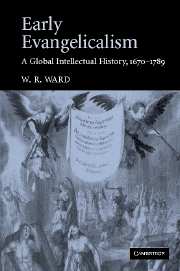Book contents
- Frontmatter
- Contents
- Acknowledgements
- Introduction
- 1 The thought-world of early evangelicalism
- 2 Spener and the origins of church pietism
- 3 The mystic way or the mystic ways?
- 4 The development of pietism in the Reformed churches
- 5 The Reformed tradition in Britain and America
- 6 Zinzendorf
- 7 John Wesley
- 8 Jonathan Edwards
- 9 The disintegration of the old evangelicalism
- Conclusion
- Select and user-friendly bibliography
- Index
7 - John Wesley
Published online by Cambridge University Press: 19 July 2009
- Frontmatter
- Contents
- Acknowledgements
- Introduction
- 1 The thought-world of early evangelicalism
- 2 Spener and the origins of church pietism
- 3 The mystic way or the mystic ways?
- 4 The development of pietism in the Reformed churches
- 5 The Reformed tradition in Britain and America
- 6 Zinzendorf
- 7 John Wesley
- 8 Jonathan Edwards
- 9 The disintegration of the old evangelicalism
- Conclusion
- Select and user-friendly bibliography
- Index
Summary
Piety and government in the age of the young Wesley
Wesley was born into a family of the narrowest of Little England sympathies. Both his parents had deserted a dissenting heritage for the Church of England, and the political instinct of both was to prefer loyalty to an English Catholic monarch in the person of James II to obedience to a foreign Protestant saviour in the shape of William III. Samuel Wesley made his peace with the powers in possession earlier than his wife Susanna. But according to John (much later) his father wrote one of the speeches for the defence in the impeachment of Henry Sacheverell, that wild Tory agitator on behalf of all those who damned foreign powers, and with them the Whig generals and their foreign victories on behalf of foreign powers. There is no doubt that this upbringing marked Wesley lifelong. Born into a Jacobite milieu, the younger brother of a (non-Methodist) collaborator of Bishop Atterbury, Wesley did not adopt the world as his parish; indeed his one substantial trip abroad was to a nest of Jacobites in Georgia, headed by General Oglethorpe, who had been christened James Edward for the Old (Jacobite) Pretender. And Oglethorpe as much as Wesley illustrated how difficult it was in a generation born to the titanic struggle against Louis XIV actually to be Little Englanders; for his service to Georgia was conditioned by the fact that he had served under Prince Eugene, and knew all about Habsburg policies of frontier settlement.
- Type
- Chapter
- Information
- Early EvangelicalismA Global Intellectual History, 1670–1789, pp. 119 - 139Publisher: Cambridge University PressPrint publication year: 2006



